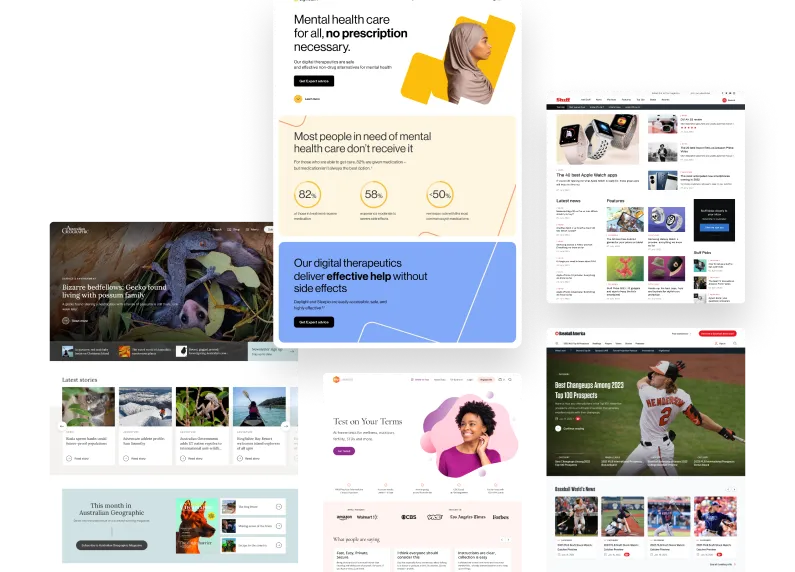The Internet is constantly changing. Whether it’s new technologies being created, or old ones going by the wayside, these changes affect us all.
One change that we almost never expect to see is in our CMS. Whether your CMS becomes too expensive to operate on, shuts down, or just stops providing the same level of support you’re used to, sometimes migrating to a new CMS is inevitable.
You might be looking for a new CMS, but why should you care which one you move to? A lot of people don’t care about which tool or how it works, as long as it works. The fact is that in order to keep your website afloat, you need to keep track of all the digital changes impacting your content and messaging strategy. Ensure your content works no matter what. A quality CMS can be the difference between headaches, or a saving grace.
Whether it’s by choice or not, you won’t want to go at it alone. Instead, find a trusted partner that can help you achieve your goals. Here are three reasons you’ll want to work with an agency partner to migrate your site.
You Need to Know Your Options
When it comes to CMS options, there are hundreds out there for you to choose from. Should you choose WordPress? Drupal? Or should you go headless? The choice is yours, but it shouldn’t be made without a word or two from someone who knows a thing or two about migrations.
We like to look at the choice from a couple different directions.
- Perform a SWOT analysis
A SWOT analysis is a perfect way to determine which CMS is right for you. Determining the strengths and weaknesses of each CMS you’re looking at can help you make a better choice in the long run.
- How difficult will the migration be?
‘Difficulty’ is an issue of complexity. Is your site only a few pages with little media, or are you running a gigantic eCommerce marketplace with thousands of images, pages, and forms? The more complex the site, the more difficult it will be to migrate.
- One? Two…hundred?
How many sites are you actually moving over? Do you own multiple properties that all need special attention, or will this be a single-site migration? Each brings its own unique set of challenges you’ll want to be prepared for.
If you work with an agency to migrate your site, we ask these questions for you and provide you with a few different solutions to choose from. Because at the end of the day, where you move your site is your choice…it’s just that some choices are better than others.
An Agency Will Plan for (and With) You
There are a lot of steps involved with CMS migration, and each step means another chance for things to go wrong. The goal is to get to the light at the end of the tunnel. By having a faster, more nimble platform, you can likely experiment more easily and rapidly. This is a major shift for your organization, and with focus you can get to a great place. Investment in up-front planning encourages you to pivot as often as needed before locking into a plan.
With that being said, proper planning and documentation is key when it comes to CMS migration. That’s why you need an agency partner to help map and plan every step of the move. Here’s a simplified way we usually handle things:
- Determine how much content there is to move.
- Trim the fat and get rid of unnecessary assets.
- Design a content model.
- Map the migration pathway.
- Construct Epics and User Stories based on the plan moving forward.
Even though a migration is usually a fixed journey, we’ve found time and time again that it’s important to be flexible. There’s often surprises and unknowns tackled in migrations, but they don’t have to be scary.
How Complex Will Your Migration Be? Let’s Find Out.
Normal
For a ‘small’ or ‘simple’ site, you’ll have less to worry about than a larger, media heavy site.
- You might be able to use some off-the-shelf migration tools
- You’ll want to monitor after the site post-migration to ensure discoverability, analytics, etc., are functioning properly.
- ‘Maintenance Mode’ might be a reasonable option.
Intermediate
A site of medium size or complexity has a bit more to consider.
- Will you need a full redesign? Will you be able to reuse some assets?
- How much data mapping will be done by hand?
- Where will you read/write data?
- You’ll probably need some custom Bash/WP-CLI scripts.
- Minimal/no code or content freeze required.
- May be able to use “Maintenance Mode.”
- Processing tools like REST API proxies or search tools like Elastic Search or SOLR might need to be built ahead of deployment.
Advanced
A large site with many assets, pages, or subdomains will be a very complex migration.
- “Maintenance Mode” isn’t an option.
- What kind of solutions do we need to create to avoid losing data or experiencing downtime? Shard/Rectify databases? REST API?
- For WordPress sites, we use WP-CLI and build pagination into the script so you can stop/start when needed.
- You’ll need a defined rollout strategy.
- Most data mapping will be done by hand.
- Testing, testing, and more testing.
But migrating data isn’t all we’ll take care of. Functionality is the backbone of a site. It’s what makes your site yours. By creating a detailed migration plan from the get go, we’ll be able to determine what functionality will carry over, and what we’ll need to recreate on the new platform.
Real-World Migrations
Rolling Stone was only one site, but had over 40 years of articles and 20 years of media to move over to WordPress. A difficult migration for some, but the XWP team took the project head on and planned the migration meticulously.
News Corp Australia, on the other hand, was a complex migration that involved a massive portfolio of sites with a variety of features and functions. Learn more about these two very different approaches to website migration in our case studies.
It Could Get Rough
Complexity matters, sure, but chances are you’ll run into some complications regardless of how complex your move is. Migration has a lot of moving parts.
- Where are you moving your site?
- How will you recreate existing functionality?
- Don’t forget mobile!
- Are you finding a new host, too?
And that’s just the tip of the iceberg. There’s a lot of behind the scenes work that, to us, is second nature. A simple ‘lift and shift’ approach might seem like it’s best for some, but once you get into the weeds, you’ll see that instead of taking the “easy” way out, creating a solid content strategy and mapping out the redesign to consolidate duplicate or thin content will make the migration so much easier in the long run.
We consider all the facts when we manage your migration. No “Gotcha” moments, here. Just hard work and a site that functions better than you could’ve imagined.
- To avoid downtime, we process the bulk of the data beforehand and then process the difference and updated data before we go live.
- We leverage cloud resources like S3 or Cloudinary to scale up processing of assets.
- Don’t make massive changes all at once after migration. SEO will be better aided by making gradual changes and reviews after the migration is finished.
A CMS migration is a huge undertaking. One that, if done incorrectly, could have massive implications for your business for a long time to come. That’s why you want an agency partner there with you every step of the way. One that can assist in planning and help avoid any snags. Not because it’s ‘easy’ for us, but because we’ve done it before. We know what to look for when things don’t go to plan, and how to quickly respond to those changes. We know how to start your organization down the path to success when it comes to choosing a new CMS.
We’ve helped some of the largest media companies in the world to migrate decades of content onto brand new CMSs, and we can help you, too.
Learn More About Our CMS Migration Services
Are you planning a move to WordPress in the near future? We’d love to help! Whether working with your team directly or just answering questions we want to help you make the move to WordPress as efficient and effective as possible. Contact us and let’s talk!


